Are you considering moving to Amsterdam? If you are, you’ll want to read through this detailed guide to the pros and cons of living in Amsterdam as an expat.
Amsterdam is one of the most popular cities in Europe for expats – especially young professional expats – to live. This is due to the English-friendly work environment, the ease of immigration, and the immense beauty and vibrant culture of the city.
Let’s start with a personal opinion: I absolutely loved living in Amsterdam! I spent about 3 years living in and around the city and dream of moving back every day. It is a world class city that is fun for people of all ages. There is always something to do and see and it’s well connected to the rest of the world.
I’ve also lived in Groningen (Netherlands), Washington DC, Las Vegas, Wellington (New Zealand), and Austin, TX, so I write this from the standpoint of someone who has experience living in many different cities and cultures.
But there are also challenges of living in Amsterdam as an expat, such as government bureaucracy, lackluster customer service, and the healthcare system. We will discuss it all here. By the end of this list of the pros and cons of living in Amsterdam as an expat hopefully you should have a better idea if it’s a good fit for you or not.
- Amsterdam – Quick Glance
- The Pros and Cons of Living in Amsterdam as an Expat
- Pro #1: It’s a world class city
- Con #1: It’s becoming increasingly unaffordable
- Pro #2: You will make friends with people from all over the world
- Con #2: The weather
- Pro #3: You will cycle everywhere
- Con #3: You will cycle in the rain
- Pro #4: The tax breaks
- Con #4: The tax rates
- Pro #5: You don’t actually need to speak Dutch
- Con #5: If you want to learn Dutch it’s incredibly difficult
- Pro #6: Impeccable public transportation
- Con #6: Government bureaucracy
- Pro #7: It’s a very safe place to live
- Con #7: Your bike will get stolen
- Pro #8: There is always a party somewhere
- Con #8: DJs dominate the music scene
- Pro #9: Excellent chilled out bar and craft beer scene
- Con #9: “Dutch” is not exactly a desirable cuisine
- Pro #10: International companies to work for
- Con #10: Limited professional growth without speaking fluent Dutch
- Pro #11: The city is simply beautiful
- Con #11: The Dutch countryside leaves much to be desired
- Pro #12: Long summer nights
- Con #12: Dutch customer service
- Pro #13: You can fly direct almost everywhere
- Con #13: You’re basically forced to fly KLM
- Pro #14: Friends will always be visiting
- Con #14: The Dutch like to plan everything way in advance
- Pro #15: Life on the water
- Con #15: Over-tourism
- Pro #16: Vacation Days and Work-Life Balance
- Con #16: The Dutch Healthcare System
- Pros and Cons of Living in Amsterdam – Final Word
Amsterdam – Quick Glance
Population: 1.46 million metro area, 921,000 city proper
Time zone: Central European Time
Elevation: -7 ft (-2 m) yes it’s mostly below sea level
Climate: North Sea oceanic climate – rarely gets hot or cold
Median home price in 2023: about 600,000 euros
Average rent for 1 bedroom apartment in 2023: 1730 euros in city center
Main industry: literally everything… finance, consulting, energy, tourism, you name it
The Pros and Cons of Living in Amsterdam as an Expat
If you’ve found this page you’re probably wondering if you should move to Amsterdam or not. So without wasting any more time let’s go through the pros and cons of living in Amsterdam. We will go through them in a pro, con, pro, con, etc format. Then you can make an informed decision if living in the Dutch capital is for you!
Note that this article will not go into how to actually immigrate to Amsterdam or get into anything about moving to another country. But if you’d like to read more about that you can refer to this article about how to prepare to move abroad.
Pro #1: It’s a world class city
Amsterdam is hands down one of the best cities in the world. Whatever your definition of “best” may be, Amsterdam qualifies. The city is historic, gorgeous, trendy, vibrant, and peaceful all at the same time.
It’s a popular travel destination for tourists from all over the world. They come to see the narrow houses along the canals, the famous museums, the Red Light District, and more. There are so many things to see and do that you can never get bored in the city.
When you live in Amsterdam, the city is yours to enjoy every single day. You’ll be hard-pressed to find someone who lived in Amsterdam but didn’t love the city itself. Everyone loves Amsterdam!
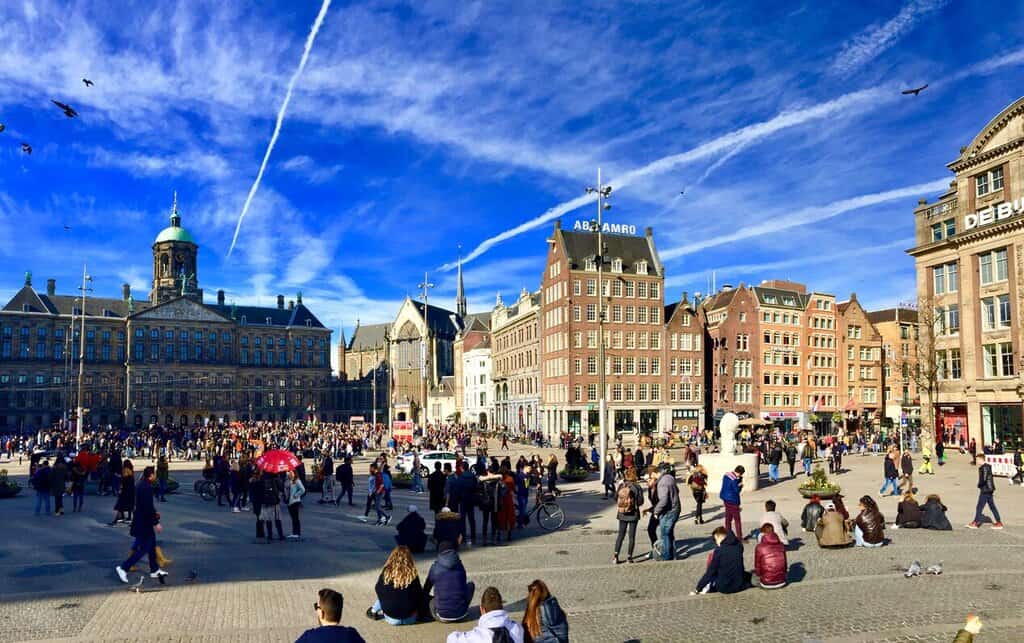
Con #1: It’s becoming increasingly unaffordable
The biggest challenge to a new life in Amsterdam is that it’s become so expensive that only the well-off are able to afford housing there. Its extreme popularity amongst expats has caused housing prices to skyrocket, driving blue collar workers out of the city (luckily it’s incredibly easy and affordable to live in another city and commute to Amsterdam, which cannot be said about New York or Los Angeles).
The housing prices just don’t match the salaries. If you’re making 50k euros a year – a pretty good salary for a professional job with 5-10 years experience – you will have no choice but to live with at least one other person. Even then you could easily be paying 1200 euros a month, which makes up a good chunk of your monthly paycheck.
Prices for everyday items and services have also gone through the roof. At the end of the month you’ll likely struggle to have saved any money unless you live very frugally or make a high salary.
If your plan is to work in a restaurant or retail or something that might make not much more than the minimum wage (12.40 per hour as of 2023) I literally do not see a way you will be able to afford an apartment in the city. Maybe the restaurant will let you eat for free because you’ll need it.
The cost of living in Amsterdam is the number one deterrent to potential expats. It should not be taken lightly. Take a serious look at your potential income versus housing and goods and services costs in the city before you decide to move to Amsterdam. If the numbers work, it’s one of the best places in the world to live. If they don’t, you are not going to have a good time.
Pro #2: You will make friends with people from all over the world
As an expat in Amsterdam you will likely fall into social circles with other expats. That is not to say you won’t have any Dutch friends, but as part of the non-Dutch speaking community you will naturally gravitate to others who are sharing English as a common language.
With so many expats living life in the Dutch capital you will end up meeting people from literally all over the world. Some of the more common countries for foreigners to be from are Italy, Greece, and Spain. The southern Europeans often come north in search of better job opportunities. They also don’t need a work visa as it’s all within the EU.
But you’ll also meet tons of Americans, Canadians, Australians, Brits, etc. I worked with folks from Bulgaria, Taiwan, South Korea, Turkey, Finland, Romania, Mexico, Venezuela, Suriname, the Dutch Antilles, and more. It’s such a vibrant international community.
It can sometimes be a challenge forming friendships with people from other cultures but you all share the common bond of being expats in Amsterdam. As I write this I’m planning a trip to Puglia in Italy and sure enough could call up my buddy who is from Puglia for local recommendations. Your global friend network will increase substantially!
Con #2: The weather
Let’s face it: northern Europe is not known for its amazing weather. This isn’t south Italy by any stretch of the imagination. The weather in Amsterdam is often dreary, chilly, and windy. Yes, even in the summer.
Rainy days are common in Amsterdam, especially in the winter. It doesn’t actually rain too much in terms of quantity. It’s mainly just light rain that doesn’t seem to stop. Summers are better but can still be pretty rainy, especially July and August. May and June are usually the driest months, though every year is different.
It gets really windy in Amsterdam quite often. This can be a challenge when riding bikes everywhere. There’s nothing like biking into a brisk wind blowing sideways rain into your face on your morning commute! In the dark, of course, if it’s winter, as the sun doesn’t rise till about 8:45 in the morning around the solstice.
The good news is that nice days do exist and summertime brings more nice days than dreary days. Depending on where you are from, however, the rainy days can be a real bummer. If you’re from somewhere like Seattle, you won’t be phased. But if you’re from somewhere like Sydney, it’s going to take some getting used to.
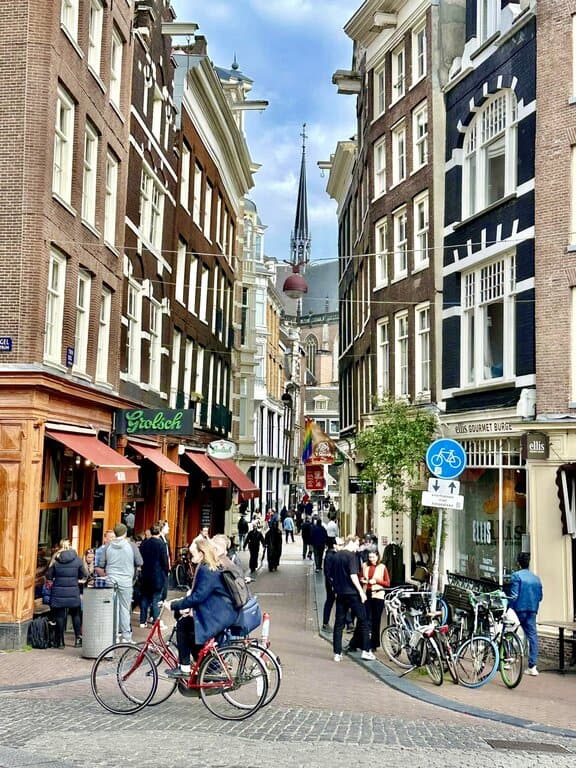
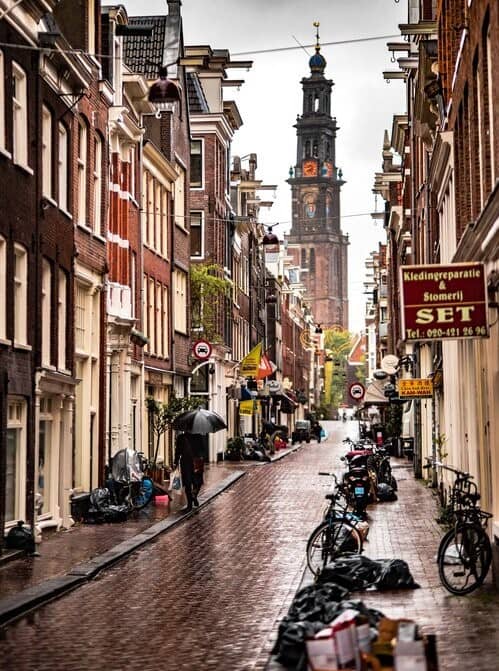
Pro #3: You will cycle everywhere
One of the best things about living in Amsterdam is that you can cycle literally everywhere. For a major international city, it’s actually really small. You can bike from the far east side to the far west side in under 45 minutes. A car might take you just as long with the traffic.
The cycling infrastructure in Amsterdam is second to none. Bike lanes are everywhere and bike parking is usually available anywhere you stop. The city is set up so you can bike everywhere you need to go. It’s really quite remarkable.
On top of the ease of cycling, it’s free and it’s good exercise. Most Dutch people are thin. It’s not the awful fried food they like to eat. It’s the cycling! The Dutch also don’t like to spend money unless they absolutely have to, so it’s the perfect way to get around.
Con #3: You will cycle in the rain
With cycling as your primary mode of transportation, it’s inevitable that you will end up biking in the pouring rain. You will actually end up doing this a lot in Amsterdam. Or my personal favorite: biking into a gusting wind blowing light sideways rain into your face. This is a reality that you are going to have to get accustomed to.
As we already discussed, the weather in Northern Europe is not exactly the best. You will need a rain jacket and rain pants handy at all times, even if rain is not in the forecast. If you’re cycling with a backpack, you’ll also want a waterproof backpack cover. It’s best to carry all of these in your backpack at all times on your commute to work.
Pro #4: The tax breaks
One of the biggest incentives for expats moving to the Netherlands is what is known as the “30% Ruling.” This is essentially a tax break for foreigners that reduces their taxable income by 30%. So if you were making 100,000 per year (just an example for illustrative purposes, you absolutely will not make that much in Amsterdam) you would be taxed as if you only made 70,000. You can benefit from this ruling for 5 years maximum.
Why is this tax incentive provided to foreigners? Well, a lot – like a lot a lot – of tax money goes to public pensions in the Netherlands. As a foreigner, you are not eligible for that pension unless you relocate permanently and become a citizen. So the government basically saves you from paying other people’s pensions. Hence why it’s only allowed for 5 years. After that they assume you’re here to stay and you gotta pay full taxes just like any other Dutchman.
It’s quite remarkable really. For me, it saved me well over 1000 euros per month. My effective tax rate ended up being lower than my effective tax rate in the United States! In a “socialist” European country!
Now, the big disclaimer here is that you must be on a specific skills shortage work visa for the 30% ruling to apply. If you are an EU citizen you can work freely in Europe and are not eligible. Only people from non-EU countries are eligible. And not every type of job fits the criteria.
If you’re working at a restaurant or somewhere in the service industry you will not qualify. If you are a digital nomad you will not qualify. If you plan to enter the country on a working holiday visa or a visitor visa and then find a job you will not qualify. You have to be recruited from overseas to fill a specific position.
The good news is that there are tons of jobs that meet the requirements for the skills shortage. The Netherlands is not a big country, but it has a big economy. They often rely on highly educated foreign workers and you can be one of those.
If you’re a computer programmer you should be golden. Even if you’re an engineer, a marketing professional, or any number of other professional jobs, you can probably find a job in Amsterdam that will get you the 30% ruling.
Lastly, note that if you enter the country as the spouse of someone with the skills shortage work visa you are not eligible. You will be on a dependency visa. If you find your own job separately before moving to the Netherlands and you and your spouse both have offers and apply separately through immigration you could also get the 30% Ruling though.
Con #4: The tax rates
We can’t talk about tax breaks without also talking about tax rates. Many people will not be eligible for the 30% Ruling and will have to pay the full tax rate. If you’re not from a European country already, these tax rates can be quite shocking. European countries are known for having amazing social benefits, healthcare, and pensions. It’s not free though. These programs are funded entirely on taxpayer contributions.
The Dutch tax code is actually incredibly simple. As of 2023, on income up to 73,031 euros you are taxed 36.93%. For any income over 73,031, your remaining salary is taxed at 49.50%. So if your salary is 50,000 per year, your take home pay will be 31,535. If your salary is 80,000 you’ll be taxed 36.93% on 73,031 and then 49.50 on the remaining 6,969 taxed at 49.50%
There are also wealth and investment taxes that we won’t get into. You probably won’t have to worry about that since nearly all your money will go towards paying rent! (see con #1).
Pro #5: You don’t actually need to speak Dutch
Moving to a foreign country that speaks a different language can be quite difficult. Luckily, just about everybody in Amsterdam speaks fluent English. The Dutch are some of the best English speakers in the world.
You really don’t have to speak a word of Dutch to live happily in Amsterdam. Sure, it makes it a lot easier to know some of the language. But it can be done. Just ask my wife!
If you don’t speak much English, however, you are going to struggle. Very few people move to Amsterdam without being fluent in English.
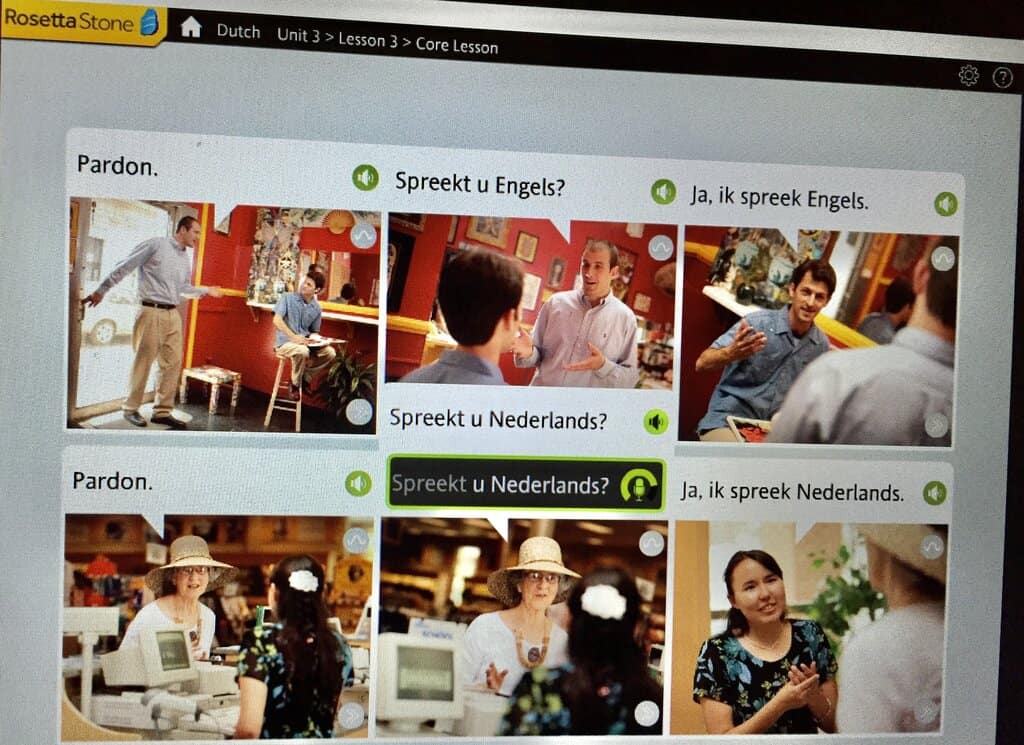
Con #5: If you want to learn Dutch it’s incredibly difficult
Even though you don’t have to, you’ll be encouraged to learn Dutch, most likely by your employer. It’s also good – and respectful – to at least make an attempt to learn the language.
Knowing some Dutch will make many things a whole lot easier. From reading letters in the mail to knowing what’s on the menu without having to take out your phone, it is worth it to try to learn.
The thing is… learning Dutch can be very difficult. Not only is it a confusing language with crazy grammer and difficult to pronounce words, but it’s hard to immerse yourself in it.
Go to Italy or Spain and you’ll basically be forced to speak Italian or Spanish. But everyone in the Netherlands speaks such good English that they often don’t want to talk to you in your broken Dutch. It’s easier for them to just switch to English than try to understand what you’re trying to say.
The only people I knew that became fluent in Dutch had a Dutch partner. Someone willing to be patient and speak Dutch with them.
I got as far as I could in Dutch classes, finished all the online courses and phone apps, yet still couldn’t hold a normal-paced conversation in Dutch after four years of trying. I could read anything you gave me. But when it came down to it I just couldn’t keep up with the pace of conversation. I eventually gave up, defeated.
So yeah, it’s very difficult to learn the language. If you really want to learn, find a local girlfriend or boyfriend!
Pro #6: Impeccable public transportation
Public transportation in Amsterdam and the rest of the Netherlands is superb. It’s comprehensive and can get you to any corner of the city and every small town in the country. There are buses, trams, underground metros, trains, and ferries. All run on the same operating system (you’ll need an OV Chipkaart so if you’re heading to The Hague or Rotterdam you don’t need a separate transport card. The ferries are free though (yay!).
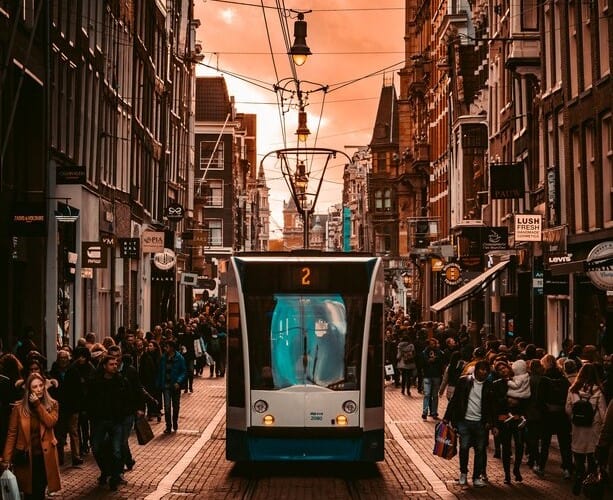
The majority of Amsterdam citizens do not have cars. In fact, I knew exactly zero people who lived in Amsterdam and had a car. I knew plenty of people with cars, but they didn’t live in the city. Amsterdam residents rely on their bikes and public transportation to get everywhere.
Trains, trams, and the metro line run pretty consistently. The bus system can be quite a while between buses depending on the line. Trains are obviously the fastest mode of public transport, but they are the most likely to get delayed or canceled. Either way, no matter where you are heading, you can get there with public transportation.
Con #6: Government bureaucracy
It wouldn’t be northern Europe without a little bit of government bureaucracy. Living in Amsterdam you’ll be subject to seemingly needless regulations. But this is just part of life in the Netherlands.
When you move to the Netherlands you’ll have to register your home address with the local municipality. Immediately. It’s the first thing you have to do. In order to open a bank account you need to be registered with Gemeente Amsterdam.
So if you don’t have a job before moving to Amsterdam you’ll need to figure out how you’re going to show a source of income in order to get approved for an apartment. It’s a bit of a catch 22, but it can be done.
Opening a bank account, getting your immigration papers sorted, applying for health insurance, it can all be one giant pain in the ass. So be prepared for that.
Pro #7: It’s a very safe place to live
Amsterdam is a very safe city. Violent crime does happen, but it’s rare and usually only between rival gangs. Yes, there is gang violence in Amsterdam. You won’t see them anywhere you’ll be hanging out, but homicides do happen. About 15 per year in Amsterdam if you want a number. That’s like an average Tuesday in Chicago.
Violent crime rates in the Netherlands are some of the lowest in Europe. In general, you’re unlikely to be the victim of a violent crime in Amsterdam or anywhere in the Netherlands.
Con #7: Your bike will get stolen
On the contrary, you will almost certainly be the victim of petty theft. Bike theft is rampant in Amsterdam. It happens every day, everywhere, all hours of the day and night. And it will happen to you.
Doesn’t matter if your bike is locked. The thieves don’t care. It will get stolen at some point. If you leave it unlocked it will definitely get stolen. But the thieves have tools to break your lock. So if they decide they want your bike today, there’s not much you can do.
I averaged about one stolen bike per year living in Amsterdam. Luckily bikes are cheap and plentiful and you can just buy a new one. Or if you don’t want to deal with a stolen bike you can rent a Swapfiets.
Swapfiets is a monthly bike rental service. “Fiets” means “bicycle” in Dutch. It’s called “swap” because if it needs maintenance they will just give you a different one and take the broken one. It’s much more expensive than buying a basic used bike. But the thieves won’t steal them because they are branded and it’s too much work to repaint them before trying to resell.
Pro #8: There is always a party somewhere
Amsterdam is a party city. There is always something going on. In the summer there are festivals every weekend and nightclubs are hopping to the wee hours of the morning all year round.
There are bars all over the city center and the western neighborhoods where young professionals tend to live. And every night of the week is popular at the bars. If you like a good night out, living in Amsterdam will not disappoint.
Unfortunately, Amsterdam’s nightlife scene makes it a travel destination for young males looking to get hammered. It’s popular for stag’s parties (bachelor parties) and for groups of friends to just come and drink. In recent years, the city has really been trying to discourage this sort of tourist though, so hopefully it’s getting better.
Con #8: DJs dominate the music scene
Now some people might consider this a positive, but music in the Netherlands = DJs. House music completely dominates the Amsterdam bar and club scene as well as the rest of the country. When Dutch kids take music class in elementary school they learn how to work a turntable.
That might have been a joke but it has a glimmer of truth. I mean just look at the picture below. Joking aside, the Dutch – and many of the expats living in Amsterdam – love DJs and house music. Good luck finding a live band at a bar in Amsterdam. You’ll surely find a lot of live DJs though.
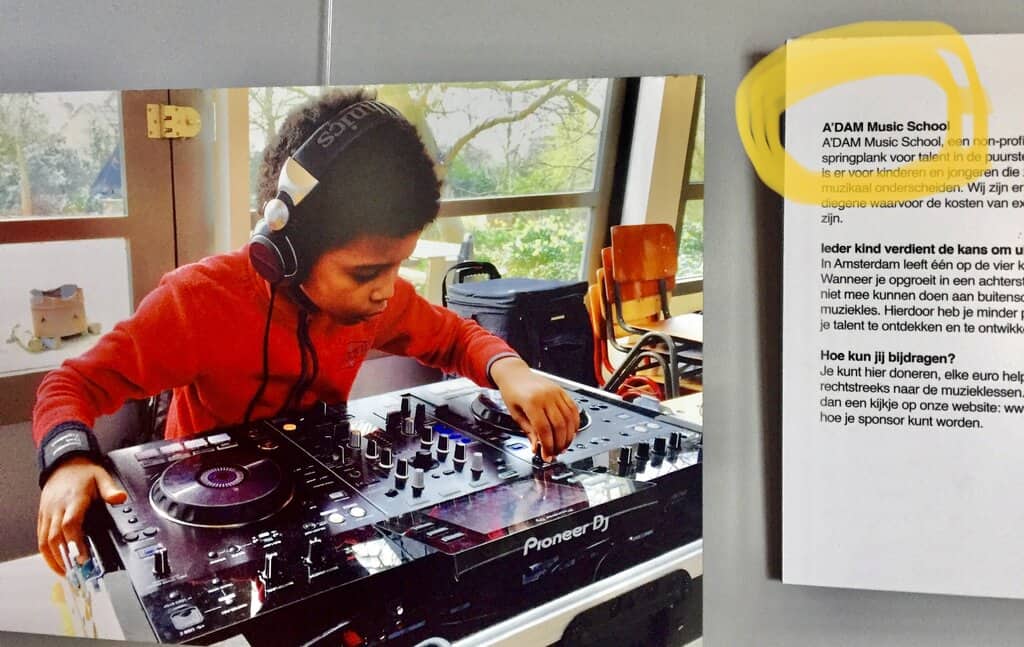
There is still an appreciation for other types of music in the Netherlands. Most big bands come through and play to large crowds. Metallica and the Backstreet Boys played to over 10,000 people at the ZiggoDome. And when an act like Ed Sheeron or Bon Jovi comes through town they play the football field. You just won’t hear this type of music out on a typical night in the city.
Pro #9: Excellent chilled out bar and craft beer scene
If you’re not up for bumping to ridiculously loud house music all night, you’ll still be happy in Amsterdam. There is a remarkable craft beer and pub scene that will appease your taste buds and please your eardrums.
The craft brewing revolution did not spare Amsterdam. There are over a dozen microbreweries across town as well as tons of brewpubs and craft beer bars. I go into great detail on the craft brewing scene in this article about the best breweries in Amsterdam so be sure to check that out if you fancy a good beer.

Con #9: “Dutch” is not exactly a desirable cuisine
If part of the romantic sense of living in Europe for you is eating all the amazing food at the cafes, then perhaps you should consider trying to find a job in Rome or Paris. The Dutch are not exactly known for their food. That isn’t to say that they don’t have some awesome culinary inventions and great restaurants. Just that people aren’t typically dying to eat Dutch food.
You’re probably wondering now what exactly is Dutch food? Good question. It’s not really a cuisine, more of a style of food that involves a lot of potatoes, seafood, and fried stuff. I go into great detail about food in the Netherlands in this post about Dutch food culture. If you’re moving to Amsterdam it’s good reading.

Pro #10: International companies to work for
One of the main reasons expats move to Amsterdam is because of the job opportunities. The Dutch are known for their international business acumen. There are tons of global conglomerates based or operating in Amsterdam and many of these operate in English or at least have some English jobs.
Some large companies that offer jobs in English are Heinekin, Booking.com, Uber, Shell, Deloitte, KPMG, and Phillips. There are also tons of other not as massive companies that operate in English, especially anything that involves computer programming.
Essentially, if you’re a professional worker looking for a job in English, Amsterdam has better opportunities than most non-English speaking countries. Copenhagen is another example of a European city where English speaking jobs are plentiful.
Con #10: Limited professional growth without speaking fluent Dutch
While jobs might be plentiful for English speakers in Amsterdam, management is typically still 100% Dutch. It can be difficult to grow up the corporate ladder without being able to converse and attend meetings in Dutch.
Not impossible, but difficult. And it totally depends on the company too. If it’s a Dutch company like Heinekin or Shell, the upper management will operate in Dutch. If it’s a foreign company like Uber or Meta, it might be a little easier for you to climb the ranks without speaking Dutch.
I worked for a large engineering consultancy in Amsterdam. While half our office didn’t speak Dutch, it was still very difficult to progress without speaking the language fluently. I spoke pretty solid Dutch, but not enough to have a normal paced business conversation.
Challenges like this are one of the main reasons most people eventually leave Amsterdam and settle back in their home countries. If you do manage to learn Dutch, however, the sky is the limit!
Pro #11: The city is simply beautiful
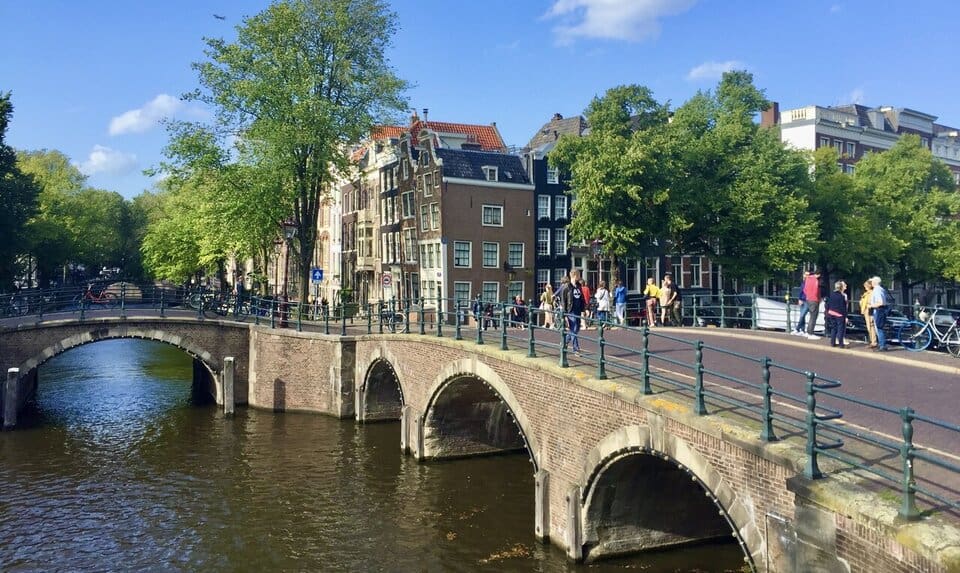
It goes without saying that Amsterdam is a gorgeous city. Everywhere you look is a scene from a postcard. Living there you will feel a sense of pride that you live in one of the most beautiful cities in the world. A place that people dream of visiting just once in their lives. And you live there!
It’s easy to take it for granted. So just remember that not everyone is as lucky as you, living in this beautiful place.
Con #11: The Dutch countryside leaves much to be desired
While Amsterdam and many of the Dutch cities and villages are splendid, the countryside is pretty much as boring as you can get. The Netherlands is almost completely flat (there are hills in the far south near Maastricht) and almost completely devoid of indigenous vegetation.

It’s essentially endless grassy fields and farmland for as far as the eye can see. There are windmills and tulip fields to break up the monotony, but overall a drive through the Netherlands is pretty dull.
There is not much natural beauty in the country. In fact, there is literally none. Everything beautiful in the Netherlands is man made. There’s nothing wrong with that, and it’s a tribute to Dutch engineering and ingenuity. Just know that going in and you won’t be disappointed.
But hey, it’s better than driving across Nebraska!
Nebraska: Honestly, it’s not for everyone (actual slogan for Nebraska tourism)
Pro #12: Long summer nights
Summers in Amsterdam are flat out awesome when the weather cooperates. A lot of people don’t realize just how far north Europe is. Amsterdam’s latitude is 52.4 degrees north. By comparison, New York City is 40.7.
This leads to really long days in the spring and summer. It’s not quite northern Norway but the summer solstice sunrise is 5:17 AM with a sunset of 10:06 PM. It gets pitch black at night, but not for long.

There is dark blue in the sky till about midnight and you can reasonably do daylight activities till almost 11:00 at night for nearly all of June. It’s a good idea to invest in some blackout curtains if you’re someone who can’t sleep without the room being totally dark.
The opposite of this, of course, is that winters are very dark. The sun doesn’t rise till almost 9 AM and it’s pitch black by 5 PM. It’s worth it for those long summer nights though!
Con #12: Dutch customer service
The Dutch are not particularly known for providing outstanding customer service. You know that saying that the customer is always right? Yeah, well not in the Netherlands. It’s not exactly that the house always wins. Just don’t expect to have the upper hand just because you are the customer.
Getting someone helpful on the phone when calling a big company like the phone company or the train service can be challenging. I’m not saying that everyone you speak with is going to be unhelpful. It’s just that you’re far more likely to come out not getting what you want than you’d be in other countries that are more service-focused.
Restaurants can be a whole situation too. I’ve left restaurants before because the service was unbearable. If your food takes an hour longer to come out than expected you’re not gonna get a free dessert or anything like that. You’ll be lucky to get an apology.
Now, don’t get me wrong. Terrible restaurant service is not the norm. But it does happen and you will experience it at some point. Just take it in stride and remember that they’re not being rude, they’re just being Dutch!
Pro #13: You can fly direct almost everywhere
Amsterdam Schiphol Airport is one of the biggest airports in Europe and one of the most well connected airports in the world. You can fly direct just about anywhere from Schiphol.
The only continent you can’t get a direct flight to is Australia, as it’s just too far. There are a surprising amount of direct flights to South America and the Caribbean. And quite a few to Africa as well.
On top of all the intercontinental routes, you can get a flight to just about any European city you can think of from Amsterdam. Especially Mediterranean holiday destinations like Greek islands (link to Santorini post) and Spanish beach towns.
While KLM is the main carrier for the Netherlands, you’ll find better rates for local flights on Transavia (which is actually owned by KLM) or EasyJet. Many other European regional airlines fly to Amsterdam too. I think you get the point by now!

Con #13: You’re basically forced to fly KLM
While you can fly anywhere from Amsterdam, chances are you’ll have to fly KLM, the Dutch national airline. As the national carrier of the country, KLM dominates the runways at Schiphol airport, especially for long-haul flights. Now, KLM is not the worst airline in the world by any stretch of the imagination. It’s also nowhere near the best.
KLM is fine for short flights across Europe. But when you have to fly them long-haul I recommend seeing if you can get a flight on a different airline. They’ll get you where you want to go and their prices are decent. But their in-flight service is well below average for international carriers (see previous notes about Dutch customer service).
If you want a beer, it’s Heinekin or bust. And they offer two god-awful wines from South Africa in the wine department. You also only get offered a drink during the first meal service. Their food is not exactly great either. But hey, at least they offer drinks and food. SAS, the Danish carrier, doesn’t offer drinks and only has one food dish so you can’t even choose.
Lastly, KLM has by far the worst customer loyalty program of all the major global airlines. Flying Blue is their rewards program and you need to fly a ton to be able to actually earn any free flights.
After four years of almost exclusively flying KLM – including many overseas long-haul flights – I had about 24,000 points. Good for a round trip flight within Europe or the US, not including taxes of like 60 Euros. When a flight on Transavia or EasyJet costs 100 euros, kind of hard to justify using those points!
I ended up using the points on a round trip flight between DC and Minneapolis on Delta a few years later. All that for a weekend in Minnesota. Score one for me! (No offense Minnesota, I actually enjoyed Minneapolis)
Pro #14: Friends will always be visiting
Living in such a popular global tourist destination means that friends are always going to be visiting. Whether or not they are coming specifically to visit you is debatable. But they will come.
You might feel homesick being far away from family and friends, depending on where you are from and how much you like your family and friends. So living in Amsterdam gives them a great reason to visit.
We constantly had people in town, either good friends staying with us or long lost friends that remembered we lived in Amsterdam and reached out when they were in town. After a few years living in Amsterdam you’ll practically be a licensed tour guide!

Con #14: The Dutch like to plan everything way in advance
There’s a joke among expats in Amsterdam that goes a little something like this:
Expat texts his Dutch friend in summer of 2023.
Expat: Hey want to go get dinner?
Dutch friend: Jawel! Let me check my calendar.
Expat: OK!
Dutch friend: Good news! I’m free October 27, 2026. Shall we say 7:00?
Expat: I was thinking, like, you know, Friday.
This joke is, of course, an exaggeration. But it gets the point made. I knew a couple who would plan dates with each other in their Outlook calendars. This is the reality of planning in the Netherlands.
Many expats find this frustrating, but it’s just part of life here. Of course not all Dutch are like this. Especially the younger ones who are more international and used to having friends from other countries and cultures. But don’t be surprised when it takes weeks to set up something as simple as meeting a friend for a drink in Amsterdam.
Pro #15: Life on the water
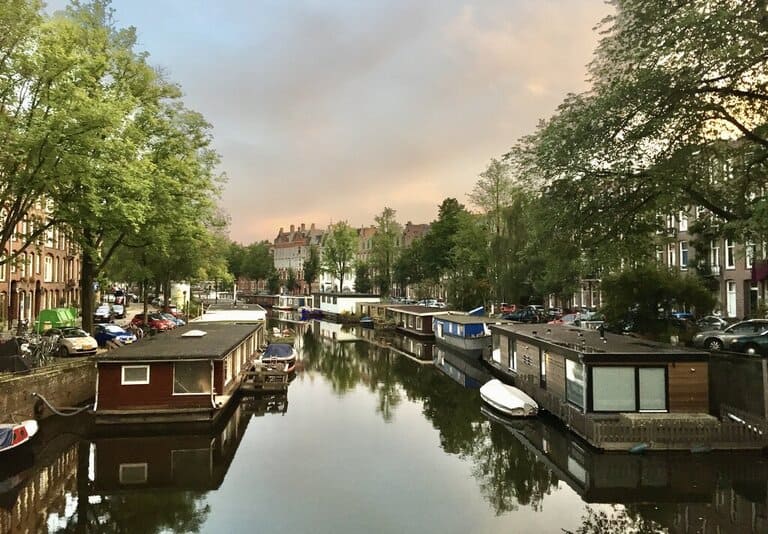
The name Amsterdam comes from the damming of the Amstel River. After the river was dammed, a series of canals was built, essentially creating a city on the water. Amsterdam has endless miles of canals on top of two large rivers (the Amstel flows into the IJ which then flows into the North Sea.
So basically, Amsterdam and water go hand in hand. Many residents have boats on the canal. Some even live in boats (the Dutch houseboat). If you’re living in Amsterdam you’ll be presented with many opportunities to get out on the water and cruise the canals. This is especially popular on a warm summer night.
On top of all the canals and rivers, Amsterdam is only a 30 minute train ride from the sandy beaches of the North Sea. Living in Amsterdam you’ll be able to have beach days whenever you feel like it. And with the long summer nights it’s entirely possible to go to the beach after work on a weekday and catch some rays before the sunset.
Con #15: Over-tourism
Like many popular cities in Europe, Amsterdam is experiencing the effects of over-tourism. So many people want to visit Amsterdam that it crowds the inner city, especially in the summer. The rest of the year isn’t so bad (though masses of people do visit all year round), but the summers can be too crowded to even want to go to the city center.
Luckily, as a resident of the city you won’t spend too much time in the city center. But there are a lot of great restaurants down there so you won’t want to avoid it all summer.
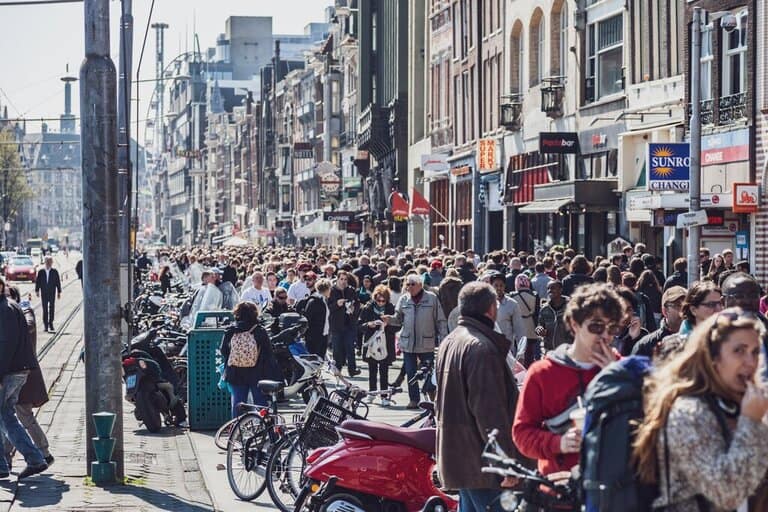
The streets are noticeably busier in July and August but can be busy with tourists from around the world any month of the year. The mass tourism has also raised prices of hotels, restaurants, and everything else that tourists frequent in the city.
For as beautiful as Amsterdam’s city center is, sometimes it’s just too damn busy to properly enjoy and appreciate.
Pro #16: Vacation Days and Work-Life Balance
In the Netherlands employers are required to provide at least 20 days of annual leave for staff. Most offer more than this, usually around 24 or 25 days. So you’re likely to get 5 weeks of vacation. If you come from a European country you’re probably used to this, but if you come from Asia or North America this is going to seem freaking amazing.
In addition, unlike in the US, everyone takes all their vacation days. Even the big bosses. The work-life balance is pretty good in Amsterdam. The work week is 40 hours and most Dutch people stick to that like they’ve sworn their children’s lives on it. When 5:00 rolls around they are gone. The work can wait till tomorrow.
The government also requires employers to pay an 8% holiday bonus each year to staff. This is what’s known in the Netherlands as the “13th month.” You basically get a guaranteed 8% bonus every year and this is supposed to go towards the costs of a nice vacation. Amazing, right?
Con #16: The Dutch Healthcare System
Let’s finish with one of my all-time foes: the Dutch healthcare system. That is not to be confused with the Dutch health insurance system. That is actually quite great.
While the Netherlands doesn’t have universal healthcare like the rest of Europe, its private system is heavily federally subsidized and required by law for all citizens to have. It’s not perfect but it actually works quite well.
We are talking here about the actual healthcare in the country. The process of going to doctors and getting treated. There’s another running joke among expats in the Netherlands that all Dutch general practitioners do is tell you to take paracetamol and call back in a week if you’re not better.
It’s funny because it’s true. The Dutch healthcare system can only be described as a “just walk it off” attitude. Tough it out, don’t be a baby!
By law you’re required to go to a GP (“huisarts” in Dutch) for any ailment before you can be seen by a specialist. GPs basically work in what looks more like a university professor’s office than a medical office. You sit at a desk and tell them your complaint. They then tell you to give it a few days and come back if it’s not better.
If you’re pushy you can get a referral on the first visit. Your GP is essentially just a middleman and typically offers little to no actual medical advice. Where you want to end up is a specialist at a hospital.
I could go on forever about the Dutch healthcare system, but that’s not what this article is about. Just know that it’s far different than what you’re probably used to in your home country and you might have to fight to be taken seriously.
Pros and Cons of Living in Amsterdam – Final Word
Hopefully by now you have a much better picture of what it’s like to live in Amsterdam. We have gone through all the pros and cons of living in Amsterdam (though there are probably many more) and you should be able to make an informed decision of if it’s right for you.
Most people love living in Amsterdam. I’m sure you will too so long as you can afford it! It’s a wondrous city with a rich history and culture. If you do decide to move there I hope you make the best of it!
If you’re seriously considering a move to Amsterdam after reading this, you’ll probably also want to check out my Local’s Guide to Amsterdam, the 11 Best Day Trips from Amsterdam, and my ideal Netherlands travel itinerary. And if you’re wondering how Dutch got all those “van” and “de” names, check out my explanation of the origin of Dutch surnames. Enjoy!

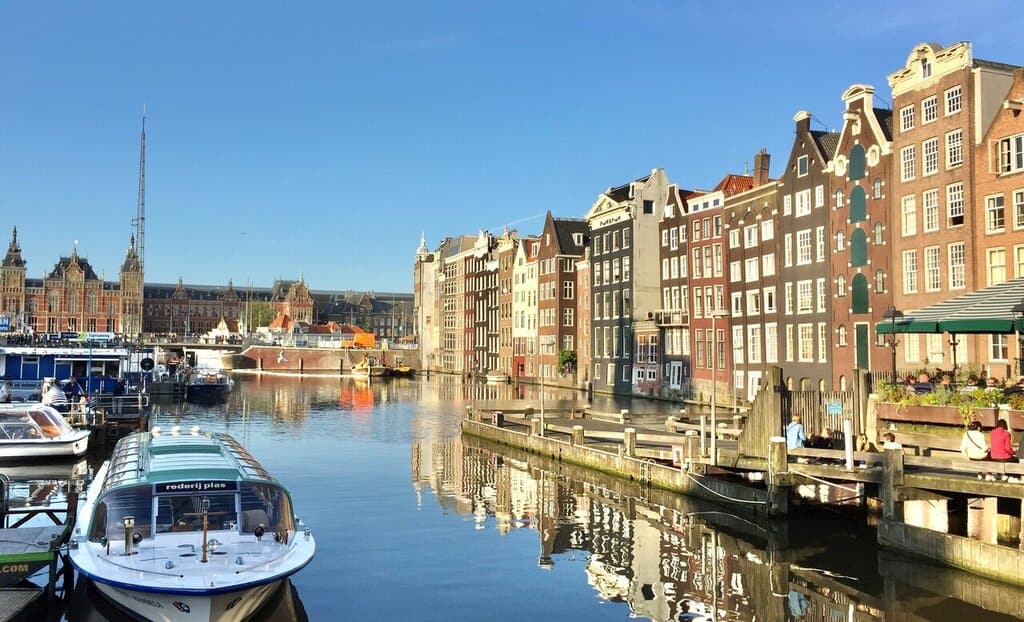
3 comments
“Con #11: The Dutch countryside leaves much to be desired” – Well, yes and no. If you end up spending most of your time in the west of the country, then this is definitely true, despite there being some nice bits of nature in the coastal area. However Maastricht is far from the only place that has different scenery; actually most of Limburg does and then there’s the Veluwe region and the Utrechtse Heuvelrug in the middle of the country, the Nijmegen area and Sallandse Heuvelrug in the east, de Peel and several other regions in Brabant. Also several of the islands offer different panoramas from what you describe, which in all honesty sounds like a caricature of the Holland area mostly.
Clearly there are a many countries with breathtaking nature, and it would be silly to compare the farmland-ridden Netherlands to that, but your description seems a tad unfair to the rest of the country, if not quite Randstad-centric (which yes, makes sense given the subject of this post).
Con #13 about being forced to fly KLM is obviously nonsense, and also even clear from what you write yourself. Schiphol is one of the largest air traffic nodes of Europe and there are often several airline options for many destinations.
Con #16: Sorry to say the healthcare bit is rife with actual misinformation. The Netherlands, for in all intents and purposes has had universal health care since 1966, even before many of the other western European countries, so I’m not sure what you’re on about. Then, much of it is government-funded (60+%), not just privately as you describe. Moreover, your whole point about quality seems to be personal n=1 beef with specific healthcare providers than something that can be generalised to the level of the whole country.
Having moved around between places in NL and abroad, I’ve mostly received comparatively good-to-excellent care within the Low Countries, which indeed sometimes means an initial ‘no’ to instantly prescribing antibiotics or other pharma-pushed substances (which is more common in e.g. Germany and Austria). I have however never felt ‘not taken seriously’ in my request for help.
Also, from my personal experience and that of several other expats, the quality and possibilities for mental healthcare in the Netherlands is up there in the top 10 for this continent.
All in al, no, it is definitely not perfect and especially the health insurance system itself could be improved upon a lot, but the quality is not as bad as for instance in Sweden – a place that has managed to project a much more positive outward image regarding its healthcare system than it actually deserves quality-wise. And let’s not even try and broach this subject with regard to the US, which as far as I know is the only western country that does not have universal healthcare to this very day.
Thanks for the feedback, Peter. I’ve never heard an expat say they were happy with their doctors in the Netherlands. I made sure to distinguish between healthcare and health insurance, as they’re two completely separate things. It would be an interesting survey to see how expats view their healthcare in the Netherlands. We personally had very bad experiences and it’s one of the reasons we ended up leaving. But I tried not to base this on my experiences, but discussions with my friends and colleagues, who all seemed to have similar gripes, especially about huisarts!
My apologies Chris, It was not my intention to discount your personal experiences and those of the other expats you mention. I’m also sorry to hear it was one of the reasons you left. Despite NL being a small country, there are some social and cultural differences between the west/Randstad area and for instance the east where I currently live. Perhaps these could account for our different experiences.
What I will also say is that indeed I have sometimes noticed that (people in general and) some healthcare providers in specific struggle with English in a professional context a bit (both medical jargon and social pleasantries) and their bedside manner subsequently gets somewhat overshadowed by this.
Don’t get me wrong: it’s an absolute luxury to be able to speak English most of the time; this is rather an attempt to account for bad MP experiences, and I do notice that some Dutch people become a bit more ‘blunt’ in their expression when unexpectedly having to switch to English, which, given the impeccable fluency of many others, then possibly comes across as intentional(?).
But yeah, I don’t know: perhaps huisartsen in the west are just not that pleasant to deal with.